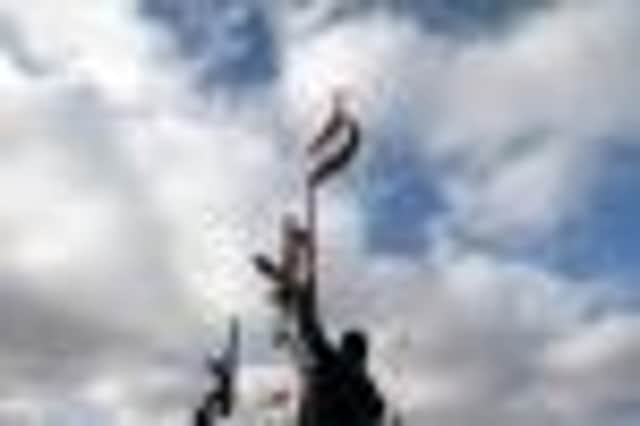Syria: Assad’s army rethinks tactics for war


Though better armed and organised than the rebels, two years of fighting have pushed president Bashar al-Assad’s military to scale back its ambitions and rethink its tactics.
In recent days, the regime has signalled a growing anxiety over its ability to refresh the exhausted ranks of soldiers, and has continued to consolidate its forces around the capital, Damascus.
Advertisement
Hide AdAdvertisement
Hide AdYesterday, the UK-based Syrian Observatory for Human Rights said clashes were concentrated in the neighbourhoods of Jobar and Barzeh. But even as the military pushed back there, the rebels opened a new front, in an area between Damascus and the Israeli-occupied Golan Heights.
Rebels attacked a barracks manned by elite Republican Guards and the Fourth Mechanised Division, headed by Mr Assad’s brother Maher, in Khan Sheih, four miles from the outskirts of Damascus, activists said.
Syria is now a patchwork, where the government retains at least a partial grip on most major cities but where the rebels have extended their authority across a growing area of the north and north-east.
For Mr Assad’s government, the insurgency has overly taxed a military designed not for sustained asymmetrical combat, but to repel an Israeli invasion.
A pro-government newspaper suggested on Tuesday the war could go on “for years”. No longer do regime forces fight the rebels wherever they pop up, instead they focus on protecting their strongholds. And in recent days the regime has placed new emphasis on mobilising civilians to take up arms for what it paints as a battle for Syria’s existence against foreign-financed terrorists. Some in Syria even report the regime has begun putting pressure on Christians to join the army. At the same time, it has turned to Syria’s top Muslim cleric to press young people into military service, despite Mr Assad’s assertion that he is defending a secular order.
In an unusual appeal on national television on Monday, the grand mufti, Sheikh Ahmad Badr al-Dine Hassoun, urged Syrians of all religions to join the army. “Syria is the last model of a civilised nation which converts diversity into richness instead of clashes and weakness,” he said.
The strategy, analysts say, aims to relieve the strained forces from the task for which they are most poorly suited – holding districts in an urban war – and conserve strength to protect the hub of government power.
The results of that consolidation could be seen last week as rebels swept into the north-eastern city of Raqqa and began setting up the foundations for self-government. Although the government continues to pound the city with airstrikes, the capture of Raqqa expanded the rebels’ territory in the north.
Advertisement
Hide AdAdvertisement
Hide AdYet with the army still strong in the centre, analysts say the country is increasingly divided between tight government control in Damascus, de facto rebel control in the north and some Damascus suburbs, and a bloody and increasingly sectarian paramilitary battle in contested cities such as Aleppo and Homs.
Much of the Syrian army remains well organised and capable, said Elias Hanna, a retired Lebanese general and professor at the American University of Beirut. But he said the army risked being demoralised by the absence of a clear short-term target, “something like a truce, like surrender, like destroying the enemy”.
Now, to fill the gap further, the government is increasingly relying on paramilitary groups, according to analysts and a recent United Nations’ report.
The groups began as the pro-government militias known as shabiha, some of them given formal status as Popular Committees. In recent months they have been organised under a structure called the National Defence Forces. The US government has accused Iran, Syria’s ally, of helping build the groups on the model of Iran’s feared Basij militia.
In regime-controlled areas of Aleppo, Syria’s largest city, many of the ubiquitous checkpoints are now operated by those groups – usually made up of locals – rather than the army, said Peter Harling, Syria analyst for the International Crisis Group, a conflict-monitoring body. As people lose faith in the army, they are loathe to risk death on far-flung army deployments, he said, while “holding your ground, protecting your own neighbourhood, is far more appealing.”